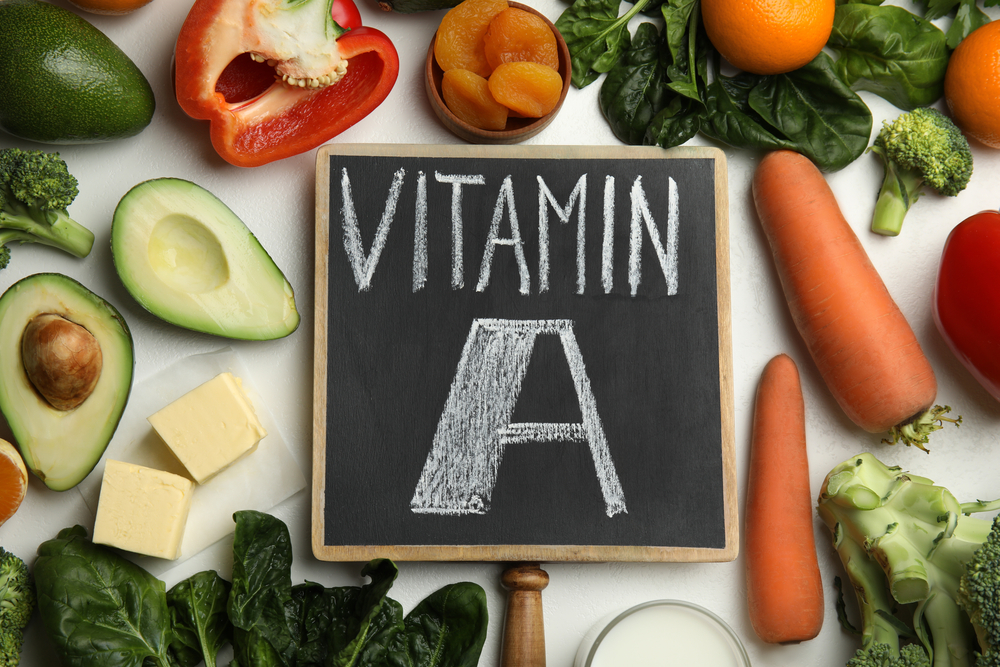Vitamins A - is a group of organic chemical compounds, which are classified as retinoids. The largest known compound from the group of retinoids is retinol. These substances have important functions in our body as essential nutrients and help to dissolve fat-soluble vitamins in their solvents.
Where does Vitamin A come from?
Vitamin A can be derived from animal products in the form of retinyl palmitate. Separate important derivatives associated with vitamin A activity are retinal (aldehyde) and tretinoin (retinoic acid). This compound accumulates and occurs in plants as carotenoids. However, in the body, vitamin A is stored as retinol in the liver and fatty tissue.
Functions of vitamin A
Vitamin A is an extremely important vitamin that is vital to the functioning of our body. Its deficiency, as well as excessive concentration, can bring serious consequences. It is worth focusing on what roles this substance plays:
- Vitamin A supports the proper functioning of the body's natural defenses against disease and infection (immune system)
- Vitamin A aids vision in low light
- Vitamin A helps in maintaining healthy skin and the lining of certain body parts, such as the nose
Sources of vitamin A
Vitamin A can be found in many common and readily available foods. Examples include butter, milk and dairy products, fatty fish, animal liver and other offals, eggs, potatoes, spinach, and kale. It is important to note that the most important component in the context of Vitamin A intake is beta-carotene.
The point worth remembering is that vitamin A is fat-soluble, so it should be taken with fat-rich products. For this reason, butter is an almost ideal product if we want to increase vitamin A intake.

Daily recommended intake of vitamin A
The daily requirement of vitamin A is specified in micrograms of retinol equivalent (µg RAE), which represent the recommended daily intake. It should be noted that the suggested intake is the level of intake required for approximately 98% of human populations. The recommended daily amount of vitamin A is 900 µg for adult men and 700 µg for adult women.
Is it possible to overdose on vitamin A?
Fortunately, you can eat nearly an unlimited amount of vegetables and fruits that contain beta-carotene. The reason for this is that beta-carotene is converted to vitamin A in the liver only in the amount that the body needs. This means that there is no way to overdose on vitamin A by eating fruits and vegetables.
On the other hand, Vitamin A in the form of dietary supplements can be overdosed. Many vitamin supplements used excessively can harm our organism. Vitamin A accumulates in the liver, so an excess of this substance can be toxic to the body and leads to lead to the deterioration of health state. Even fish oil – a product that could naturally occur in our diet without supplementation - should be used under the supervision of a doctor or pharmacist.
Vitamin A deficiency
If we suffer from vitamin A deficiency, we should introduce products that contain it into our diet. However, it turns out that many people who have a well-balanced diet suffer from vitamin A deficiency. In this case, the best way out of this situation is to use additional Vitamin A supplementation. In order to achieve the best results, you should consult your doctor or pharmacist beforehand to determine the optimal dose for supplementation.
Contraindications of Vitamin A supplementation
It is not recommended for pregnant women to take vitamin A. Its excess can cause the development of birth defects in the baby. For this reason, women who are pregnant should avoid all dietary supplements that have vitamin A in their composition. In addition, they are advised to not eat offal because of its high vitamin A concentration.
Summary
Unfortunately, there is a very high deficiency of vitamin A among children in developing countries. Highly developed countries also have a problem with deficiency of this vitamin. Vitamin A deficiency may be related to malabsorption of animal fats, inadequate diet, or anorexia. The solution to this situation is the broad availability of a product in pharmacies that allows us to supplement Vitamin A deficiency.







